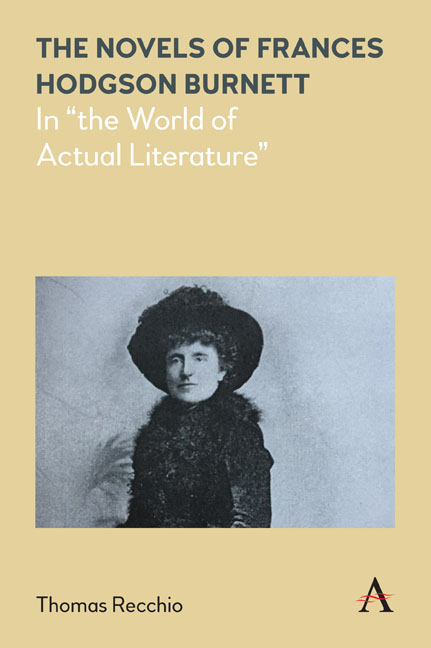Book contents
- Frontmatter
- Contents
- Acknowledgments
- Introduction
- Chapter One Learning from Elizabeth Gaskell
- Chapter Two Writing as an American: The Portrait of a Washington Lady
- Chapter Three Historical Dreamscapes and the Vicissitudes of Class: From A Lady of Quality to The Methods of Lady Walderhurst
- Chapter Four Transatlantic Alliances in The Shuttle and T. Tembarom
- Chapter Five After the Great War: Emerging from the Wasteland in The Head of the House of Coombe and Robin
- Bibliography
- Index
Chapter Three - Historical Dreamscapes and the Vicissitudes of Class: From A Lady of Quality to The Methods of Lady Walderhurst
Published online by Cambridge University Press: 24 June 2020
- Frontmatter
- Contents
- Acknowledgments
- Introduction
- Chapter One Learning from Elizabeth Gaskell
- Chapter Two Writing as an American: The Portrait of a Washington Lady
- Chapter Three Historical Dreamscapes and the Vicissitudes of Class: From A Lady of Quality to The Methods of Lady Walderhurst
- Chapter Four Transatlantic Alliances in The Shuttle and T. Tembarom
- Chapter Five After the Great War: Emerging from the Wasteland in The Head of the House of Coombe and Robin
- Bibliography
- Index
Summary
Burnett's silence as a novelist lasted 13 years, a period she spoke about in an interview with Marie A. Belloc published in The Idler (UK 1896). Asked about the fact that during those years she had been “writing about, and chiefly for children,” Burnett responded:
Yes, but that has been the result of circumstances. Since my great bereavement of five years ago [the death of her eldest son, Lionel, in Paris at the age of 16], I have not had the courage to look upon life with sufficient interest to build comedies and tragedies upon it. Children I could write about, because they do not seem quite to belong to the world. During the last year I have been physically and mentally stronger, and have written my first novel since Through One Administration.
Critics read that novel, A Lady of Quality, refracted through Burnett's previous work, but unlike the response to Through One Administration, which was read in relation to Burnett’s Lancashire novels, A Lady of Quality was evaluated in relation to her previous novels and to her more recent, and widely acclaimed children's books, including Editha's Burglar (1886), Little Lord Fauntleroy (1886) and Sara Crewe (1888). In contrast to Fauntleroy in particular, with its emphasis on moral rectitude and social decorum, the libertine world of the late seventeenth and early eighteenth centuries of A Lady of Quality came as a shock to some critics, and even today readers can be made uneasy reading it. Anne Thwaite, for instance, in the “Foreword and Acknowledgements” section of her sympathetic biography of Burnett, writes that “The [sic] Lady of Quality […] has no permanent value. I would not recommend it to anyone” (xi), and when I taught the novel in a graduate seminar on Gaskell and Burnett in the second decade of the twenty- first century, a number of my students were taken aback by the rendering of Clorinda, seemingly unable to process the moral challenge she presented to them. Those small details coupled with the inclusion of the novel on a banned books list sponsored by the Evanston, Illinois Public Library in 1902, a list that included Thomas Hardy's Jude the Obscure (listed just below A Lady of Quality), Boccaccio's Decameron, Kate Chopin's The Awakening and Frank Norris's McTeague among others, are symptoms of the novel's power and seriousness of purpose.
- Type
- Chapter
- Information
- The Novels of Frances Hodgson BurnettIn "the World of Actual Literature", pp. 93 - 134Publisher: Anthem PressPrint publication year: 2020



